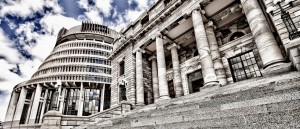 The real story of the coming election in neither corruption nor perceptions of corruption but rather what was revealed in Bill English’s reported pre-budget speech to the National Party’s Southern Region conference at the weekend. He signalled an intention to reduce the proportion of government spending to 26% of GDP over the next 6 to 7 years. The current level reported to be hovering at 30% already places NZ in the lowest quartile of OECD countries having fallen from 35% of GDP in 2008. Most developed nations, despite kinder geography and greater economies of scale, spend a significantly higher proportion of GDP on government goods and services. Bill English’s reported statement (I cannot find the whole speech online) is probably the clearest indication yet of the general direction of the National Party’s policies in a new term.
The real story of the coming election in neither corruption nor perceptions of corruption but rather what was revealed in Bill English’s reported pre-budget speech to the National Party’s Southern Region conference at the weekend. He signalled an intention to reduce the proportion of government spending to 26% of GDP over the next 6 to 7 years. The current level reported to be hovering at 30% already places NZ in the lowest quartile of OECD countries having fallen from 35% of GDP in 2008. Most developed nations, despite kinder geography and greater economies of scale, spend a significantly higher proportion of GDP on government goods and services. Bill English’s reported statement (I cannot find the whole speech online) is probably the clearest indication yet of the general direction of the National Party’s policies in a new term.
When parties approach a third term in government the claim is often made that it has run its course as far as new ideas are concerned. There are no manifesto policy announcements yet from National so we just don’t know how it is proposed that this objective be met. However it does reveal that the National Party’s basket of ideas is far from empty and that it does not regard status quo spending as desirable. To achieve this without cuts would require either extraordinarily high GDP growth, above historical averages which is very unlikely, or further large cuts to public expenditure.
For all those who hold dear the benefits to the wider population achieved by New Zealand’s Social Democratic project of the last 70 years this is where the election contrast between National and more progressive parties lies.
 We do not know what cuts are proposed but the options identified below are either are continuations of existing policy directions by the National Party or have been signalled through press releases, law changes or speeches as possible initiatives.
We do not know what cuts are proposed but the options identified below are either are continuations of existing policy directions by the National Party or have been signalled through press releases, law changes or speeches as possible initiatives.
- Further outsourcing of public sector services by competitive tender using the government’s ‘best sourcing’ model for delivering “Better Public Services’
- A continuation of the policy of ‘digital be default’ replacing staffed offices with websites and 0800 number services,
- Cuts to financial transfers to poorer New Zealanders, of the kind that put a brake on increasing inequality,
- Possible moves to means testing of benefits like pensions as was signalled in an article in yesterday’s Dominion Post
- Weakening the roles of public agencies so they are less costly to run. The model here is the Department of Conservation’s change of role to focus on volunteering and tourism rather than policy advice and species and habitat protection,
- Further privatisations, possibly using different models than the mixed-ownership model, including potentially beyond State Owned Enterprises like NZPost, Quotable Value and Kiwibank and into core services like for example the Land Registry as the UK has just done.
- The adoption of different funding models (such as public private partnerships) for infrastructure projects such as roads, hospitals and schools which keep the cost off the government books in the short term but essentially mean that for generations the public buys the right over and over to use public infrastructure.
It will be interesting to see in the lead-up to the election how this public spend to GDP ratio commitment is communicated . It seems to have been in a speech intended for party members and the bald fact of the lower ratio has not, so far as I can see, been signalled in other more public speeches.
NB. Update 31 May. The spending to GDP ratio was mentioned also in the budget speech but I have not seen its significance addressed in any media commentary of the budget.
References
Treasury graph – public spending as a proportion of GDP by country 2007
Best sourcing policy paper:
Minister of Finance’s speech to National Party Queenstown conference
Super for rich has $570m price tag

Perhaps goyt spending needs to be reduced because they need to use an increasing amount to repay debt!
My main point is that we do not know what these cuts involve, they represent a huge difference between political parties and the media is simply not interested that our public spending to GDP ratio could be heading to unprecedented low levels historically and compared with other OECD nations.
As far as the level of debt is concerned I think there are some problems in equating government debt with household debt. Governments have options that households don’t.